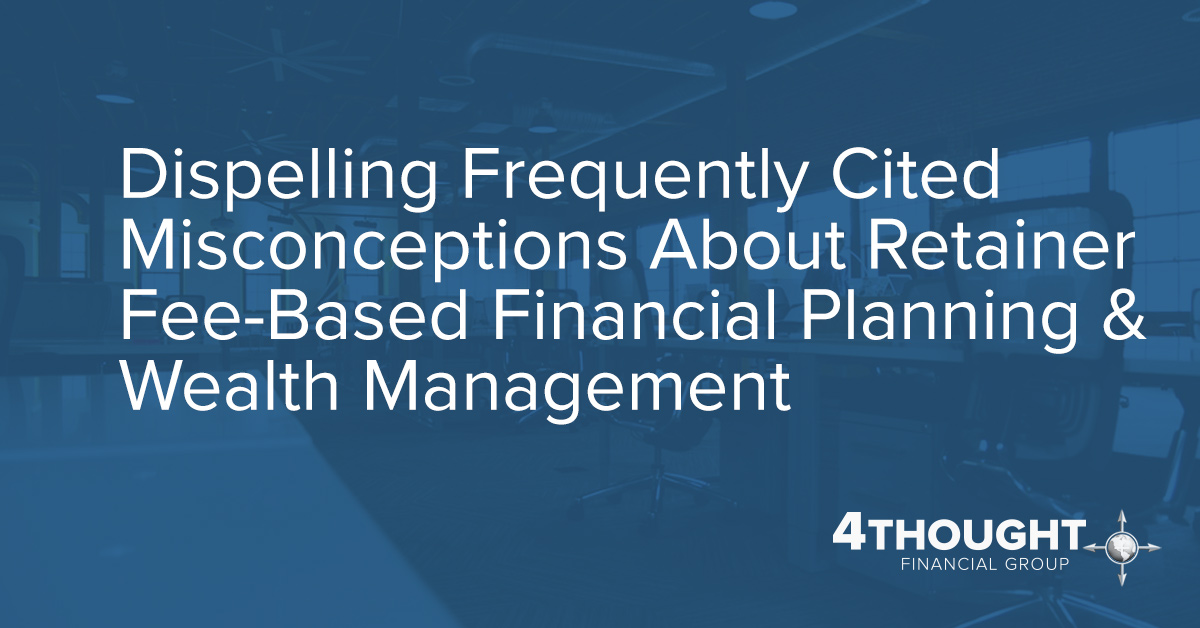A financial advisor is commonly seen as a finance professional who provides guidance and advice to clients regarding investments and how to best achieve their short- and long-term financial goals. But financial advisors may also offer a wider array of services, from investment planning and estate planning to business succession planning and group benefits, among many others.
There is an important distinction, however, with regards to types of financial advisors. While a variety of financial professionals may refer to themselves as “financial advisors”—including stockbrokers, tax preparers, accountants and/or insurance agents—many are actually salespeople. They serve the interests of a particular financial institution as opposed to working on behalf of their clients.
True financial advisors are independent, experienced, well-educated, credentialed, and most importantly, operate in a fiduciary capacity with only their clients’ best interests in mind. This “fiduciary” distinction mandates the highest ethical standards, and requires a financial advisor to act on behalf of clients similar to how those clients would act on their own behalf had they the skills and knowledge to do so.
What Do Financial Advisors Do?
Financial advisors perform a variety of services to help ensure investors’ fiscal well-being. This includes advising clients how to best save and invest, selecting the optimal financial vehicles, and implementing the proper strategies to help clients achieve their financial goals. Financial advisors develop detailed plans to help guide these efforts, secure customers’ financial stability, and build wealth.
It all begins with a universal starting point: the individual client.
Financial Planning
Financial advisors are sometimes referred to as “planning partners,” since one of their primary responsibilities is setting unique, customized goals based off consultations with the client. They listen to and address any associated concerns, develop a conceptual roadmap to achieve goals in the form of a financial plan, and may then select appropriate investments or other financial instruments for the implementation of the planning. Financial advisors may also directly manage these investments, executing the agreed-upon strategies to reach specific targets and seek to make clients’ dreams reality.
Financial advisors know that clients’ objectives vary. While one may wish to be able to purchase a vacation home, another may want to ensure he/she saves enough money over the next decade to send their children to college. Others may be focused on ensuring their portfolio is aligned toward a secure and stable retirement.
Financial advisors counsel investors and often help to diversify their clients’ risk across asset classes and strategies, again, in accordance with clients’ stated goals, and to accommodate challenges and unforeseen variables along the way. They also search for opportunities clients may otherwise miss or be unaware of.
Here are several topics a financial advisor will typically discuss, among many others:
- Individual financial situation and life goals of client
- Various accounts clients may have or require: trusts (revocable and irrevocable), retirement and savings plans, etc.
- Fringe benefits: 401(k)s, profit sharing plans, ESOPs (employee stock ownership plans), and other employee-related programs
- Estate and tax planning
- Business succession planning (for business owners)
- Insurance policies: disability, life insurance, etc.
- Budgeting concerns
- Debt reduction
Financial Educators
Financial advisors are also educators, in that one of their primary roles is helping clients understand the financial planning process and any related issues. From the most basic terms and premises to the most advanced, financial advisors inform investors of the benefits and risks, as well as all the moving parts in between.
For example, a client may wish to learn more about how to best save and budget, or more complex fiscal matters, such as how to assess and initiate the most effective tax and estate planning strategies and insurance plans.
Financial advisors help would-be investors answer the following question: ‘Where to Begin?’
Financial advisors, too, must learn and completely understand the financial health of their clients. This is crucial in order for financial advisors to effectively devise a sound financial plan to attain their clients’ goals. Without a thorough, proper assessment of customers’ financial well-being, it is impossible to craft the ideal roadmap leading there.
Besides in-person meetings with clients, oftentimes financial advisors utilize extensive, detailed questionnaires in order to ascertain accurate portraits of prospective investors’ fiscal status. These serve as guides to better inform the financial advisor, and also ensure clients do not forget about pertinent data.
Such questionnaires typically include an outline of a client’s assets, income, liabilities, and expenses. Long-term financial obligations, as well as projected retirement needs and future pensions are included, along with all current and expected income sources, investments and pension plans. Investors’ risk capacities and risk tolerances are also included—important to help the financial advisor assess the most effective strategies regarding asset allocation. Additionally, information regarding clients’ tax status, estate plan, and insurance issues will be included, among other information.
These questionnaires can sometimes be accessed and completed online.
Ultimately, the financial advisor may utilize this feedback to help create a comprehensive financial plan best aligned to meet their clients’ goals.
Creating a Fiscal Roadmap
Think of the financial plan as the blueprint for the client’s fiscal future. Not only does it include all the key data points and findings of the questionnaire, but summaries of clients’ current financial standings and a recap of their stated goals.
This comprehensive financial plan will therefore also contain many of the answers required to assure the stated financial goals are met, such as how much money will be invested, and where.
Clients’ risk tolerance and risk capacity will help guide the financial advisor’s asset allocation and the percentage breakdowns of individualized investments. Typically, risk takers will invest more heavily into stocks, while those more risk-averse will concentrate more on fixed income investments.
The following are some popular investments financial advisors may recommend:
- Mutual Funds
- Stocks
- Bonds
- ETFs (Exchange-Traded Funds)
- SMAs (Separately Managed Accounts)
- Annuities
- Hedge Funds
- Private Equity
- Real Estate Investment Trusts (REITs)
- Commodities
Ongoing Management & Monitoring
A financial advisor’s job does not end with the initial implementation of the financial plan, but rather, is an ongoing process that must modify along with the changing market conditions and ever-evolving financial goals of the client.
Financial advisors will often provide regular updates on clients’ investment portfolio, and constantly review the selected investments to ensure these are on track to accomplish their stated objectives. Financial advisors typically also make themselves available to meet with clients and discuss their investments. Additionally, the internet provides increased accessibility for clients, via so-called “robo-advisors”—financial advisors offering investment advice online—and web portals for real-time updates on accounts.
Not all financial advisors are the same, however, and customers must perform their due diligence to ensure they select the very best advisor who will keep clients’ financial interests their top priority.
How To Choose A Financial Advisor/Planner
As mentioned above, true financial advisors keep only their clients’ best financial interests in mind. They are not selling anything, but rather, advising and managing toward the achievement of their clients’ personal and professional financial goals following thorough consultation, questionnaires, research, analysis, and strategizing.
These financial advisors typically do not receive a commission based upon what a customer buys. Repeat: They are not selling any products. Instead they are offering advice as a service. Be careful not to confuse bona fide financial advisors and planners with stockbrokers—those who transactionally buy and sell stocks and other securities for a commission.
Consider the following tips when choosing a financial advisor:
- Request and review the financial advisor’s stated ethical code and the “Firm Brochure” (Form ADV Part2). The term “fiduciary” can help distinguish a true financial advisor looking out for your best interests from someone simply looking to sell you something. But even if this term is not used in the advisor’s marketing literature, you’ll be able to distinguish a fiduciary by determining whether they are a representative of a Registered Investment Adviser (RIA). Such firms offer a “Firm Brochure” (Form ADV Part2) and are required to act in a fiduciary capacity when dealing with clients.
- Research prospective advisors. It may sound obvious, but sometimes even a simple Google search can reveal plenty. Check customer reviews, performance databases, their purported credentials, and call the administrators of those credentials to verify they’re valid. Search them on BrokerCheck, a free federal site that pulls the disciplinary records of advisors, and look for any other possible red flags on the firm as well (not just the individual advisor).
- Determine the financial advisor’s pay structure. As aforementioned, those working off commissions based on the volume of sales or number of transactions they execute may have a financial institution’s best interest in mind, and not those of the client. Commission-based advisors may include stock brokers (registered representatives of broker-dealers) and/or insurance agents. Their conflict of interest resides within their pay being based upon what they sell. This can influence their recommendations. In contrast, Fee-based and Fee-only advisors are required to act in a fiduciary role and are compensated through hourly rates, a flat fee, a retainer fee, or by charging an annual asset-based fee —typically a percentage based off clients’ assets managed (meaning they’ll only make more money when your investments do). They may also structure their compensation with some combination of these fee types. These fees are not based on product sales, but are instead based on the provision of advisory services.
- Consider a financial advisor who is a CFP (certified financial planner). Although the CFP designation is certainly no perquisite to qualify as a good advisor, this title indicates they’ve at least undergone some basic training in various aspects of financial planning, and have passed a rigorous exam from the Certified Financial Planner Board of Standards. CFPs must undergo continuing education classes on ethics and other financial matters to retain this designation, which is issued by a private organization.
- Beware of those who make promissory statements or guarantee a rate of return. No one can exactly predict the future path of the financial markets, or how well or how poorly a particular investment will do with 100-percent accuracy. Those who profess they can should be viewed with suspicion. It is also illegal to guarantee performance of investments, with a select few exceptions mainly related to insurance-based contracts. On the contrary, a good financial advisor should provide you with a healthy discussion and disclosure on the nature of the risks inherent in investing.
What Are The Benefits Of Hiring A Financial Advisor?
Financial advisors possess the knowledge, skills and experience necessary to effectively work on your behalf and ensure your financial plans and investments remain on track to accomplish your objectives.
Not everyone has the time, resources, or know-how to assess their financial situation, select the proper investments and strategies to ensure a safe and sound fiscal future, or continuously update and modify this plan.
Financial advisors do, and if you select the right type, they’ll act with your best interests in mind. Reputable financial advisors will take the time and care to grow your wealth, making any necessary adjustments along the way. They will also be available to consult, advise, and answer questions.
4Thought Financial Group
Wealth management firm 4Thought Financial Group is comprised of experienced fiduciaries who consider achieving clients’ financial goals priority number-one.
In addition to its broader Wealth Management services, 4Thought has a specialized implementation platform that offers innovative, data-driven investment strategies utilizing proprietary analysis and multiple methods of investing to create enduring portfolios designed to attempt to achieve success across various market conditions.
4Thought Financial Group’s investment advisory services have a history of outperforming household-name investment management firms, recently ranking First in independent research firm Morningstar’s “World Small/Mid Stock” Separate Account category for one-year performance out of 32 investment management firms (as of 6/30/17), and both First and Second for calendar year 2016 performance amongst 407 investment management firms in the “World Stock” category (as of 12/31/16).






Leave a Comment